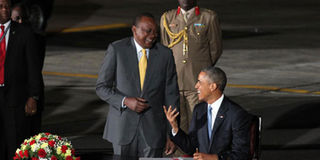US leader tame, cautious on inequality

President Barack Obama signs the visitors book on arrival at JKIA, Nairobi. The Obama visit only touched on the topic of inequality but expect a much more robust challenge and more direct criticism from Pope Francis when he comes calling in November. FILE PHOTO | NATION MEDIA GROUP
What you need to know:
- Barack Obama told the first President’s son that today’s challenges are ethnicity, corruption and inequality.
- The establishment of Huduma Centres is a positive move towards efficiency, accessibility and openness while offering a variety of services.
- Pope Francis says that human rights are not only violated by terrorism and repression but by unfair economic structures that create huge inequalities.
- There are 20 million Kenyans who have no place at the digital table.
Jomo Kenyatta claimed that the three scourges of independent Kenya were poverty, illiteracy and disease.
Barack Obama told the first President’s son that today’s challenges are ethnicity, corruption and inequality.
So have we finished with Jomo’s list, unearthed new issues or was President Obama merely pointing out that the root causes of all our ills from independence until today are fundamentally institutional and political?
Put another way, the negative ethnicity, mega corruption and growing inequality in the country are a result of a succession of bad political and economic choices made by successive regimes, with the sole aim of maintaining their grip on power rather than creating a more just and fairer society.
It is fashionable, however, to speak of entrepreneurship and growth.
But let’s remember that growth only comes when citizens recognise opportunities and the government of the day makes it worthwhile and feasible to exploit those opportunities.
In other words, the ideas come from wananchi but the government must create the institutional and policy framework that facilitates creativity and job opportunism.
The establishment of Huduma Centres is a positive move towards efficiency, accessibility and openness while offering a variety of services.
They represent a new way of governance and service delivery. But much more is needed.
PARASTATALS REFORM
The failure to implement parastatals reform is indicative of a government that cannot distance itself from cronyism, ethnicity and political patronage.
Most parastatals are over staffed, unproductive and money guzzlers, but, like the duplication of the provincial administration, they are maintained to secure the regime’s grip on the nation and to allow the favoured folk the opportunity to loot as a reward for loyalty.
Last week, the world saw Kenya at its shining, modern, digital best.
There is much to be proud of but the growing inequality must be a serious concern for anyone who is the least bit patriotic.
Pope Francis says that human rights are not only violated by terrorism and repression but by unfair economic structures that create huge inequalities.
We must end this talk of closing the gap between the affluent and those expected to be satisfied with the crumbs falling from the wabenzi table.
Francis says everyone must benefit from the fruits of the earth to satisfy the demands of justice, fairness and respect for every human being.
There are 20 million Kenyans who have no place at the digital table.
They must be sick and tired of hearing hyped media stories of the ‘‘growing middle class.’’
Nowadays the poor are the working class. Jesus may have regarded them as the salt of the earth, but in the digital era the working poor are not only subjugated to horrific working conditions, they are more and more being demonised by the establishment for not pulling themselves up by their bootlaces.
The Obama visit only touched on the topic of inequality but expect a much more robust challenge and more direct criticism from Pope Francis when he comes calling in November.
Be warned and vigilant.





